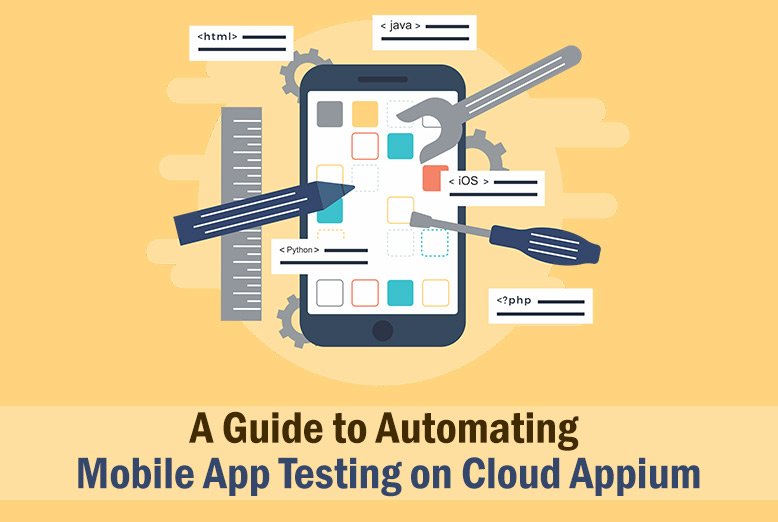According to Statista research, nearly 230 billion mobile applications will have been downloaded globally by 2022, up from about 140 billion in 2016. The sector is growing at an unstoppable rate. Thus, it’s critical that any newly released mobile apps undergo thorough testing to ensure improved user engagement. In order to provide a better user experience with a high-quality application, Appium assists in Automate Mobile App Testing.
Companies are pursuing client interactions for their applications by releasing new features every few weeks in an effort to get into this market. Businesses must compromise on the need to create a solid, error-free solution that works effectively under the pressure of delivering applications in record time.
This makes it crucial to have an Appium automation procedure that is not only rapid but also has more thorough coverage in order to meet the standards properly. The best option to fulfill these objectives is obviously app testing. One such open-source automation platform, Appium, provides scalability and flexibility while increasing the effectiveness of testing mobile apps. With its many capabilities, Appium has quickly become popular for mobile testing in the mobile application business.
In this article, we will learn about the automation testing of mobile applications on Cloud Appium.
Introduction to Automation Testing for Mobile Applications
Mobile apps have quickly become indispensable tools, placing quality and performance of utmost importance for everyday life. From banking apps and shopping sites to social networking apps and gaming programs – each requires seamless functionality; automation testing ensures this happens seamlessly. As opposed to manual testing in which human testers click, scroll, and tap manually through an app on multiple devices – automation testing utilizes special software that performs these tasks automatically saving both time and effort while improving accuracy.
App development can be an intricate and evolving process. There are thousands of devices, operating systems, and screen sizes out there; testing manually could prove too slow or error-prone to keep pace with the rapid release cycles required of mobile apps.
Automation testing offers several benefits:
- Speed and Efficiency: Automated testing runs much faster as compared to manual tests, which helps to get faster feedback for your project and you can fix them in less time.
- Consistency: Automated tests perform the same actions the same way every time, eliminating human error.
- Reusability: It allows you to write the test scripts once and you can use them across different devices and platforms, saving time and effort.
- Coverage: Automation testing for mobile applications helps to cover a wide range of test scenarios, that assures the comprehensive testing of your app.
- Regression Testing: In automation testing, the automated test cases can be rerun when the testing team brings new changes in the source code. It ensures that the existing functionality of the software should not get disturbed.
Introduction to Appium on Cloud
As mobile development evolves rapidly, Appium stands as an open-source automation tool that has revolutionized mobile app testing. Ensuring quality and functionality across devices and platforms remains key – Appium’s cloud edition stands as an effective scalable testing solution that’s both cost-efficient and scalable for testing mobile apps on demand.
- Appium was developed to automate mobile app testing and is accessible to developers, testers, and organizations of any size.
- Testers can write their tests using any programming language like Java or Python before running them across devices like iOS and Android to optimize team strategies appropriately.
- Appium on Cloud extends this flexibility by taking advantage of cloud computing’s benefits for testing purposes.
- Testing through the cloud offers many key benefits; in particular accessing real devices and emulators allowing thorough cross-device, screen size, and operating system testing without extensive in-house device lab setup costs or time savings.
- Appium on Cloud offers parallel testing through the simultaneous execution of multiple test cases – speeding up testing while increasing coverage. Companies using Appium can significantly decrease the time it takes them to bring apps to market while creating competitive advantages through this strategy.
- Scalability and Cost-Efficiency are hallmarks of success for any successful enterprise. One of the primary advantages of Appium on Cloud is scalability. Organizations can easily adjust their testing efforts according to their needs without incurring extra infrastructure expenses or burdening themselves with managing additional infrastructure requirements. This feature is especially advantageous when a business experiences seasonal or rapid growth as it can quickly adapt its testing resources in response to changing demand.
Why Appium for Mobile Application Testing on Cloud
Appium is a leading cloud mobile application testing framework and its popularity stems from multiple factors related to the cloud environment’s advantages.
Scalability: One of the primary advantages of Appium on the cloud is its scalability. Cloud platforms give testing teams more freedom in adapting testing requirements up or down as testing requirements change, seamlessly adapting to run tests on multiple devices simultaneously without hardware limitations affecting results. With this scalability feature in place, testing teams can keep up with an increasing variety of mobile devices, screen sizes, and operating systems without worry.
Cost-Effective Solutions for Mobile Testing: Appium on the Cloud offers cost-efficient mobile testing solutions. Traditional testing setups often involve purchasing and maintaining physical devices which can be expensive and time-consuming; by taking advantage of virtual devices from Appium’s library on the cloud you can gain access to them without incurring unnecessary overhead costs, helping allocate resources more effectively.
Reliability: Cloud-based platforms are well known for their dependability and uptime, making Appium the perfect partner to run tests without interruption from cloud services – key when dealing with large-scale test suites.
Utilizing the true potential of Appium testing for mobile applications is made accessible through cloud-based platforms such as LambdaTest. LambdaTest stands as an AI-powered test orchestration and execution platform enabling the running of Appium tests across an extensive farm of over 3000 real devices and various OS combinations. It seamlessly integrates with the Appium tool to optimize the testing process for mobile applications. LambdaTest also empowers the execution of concurrent tests, amplifying test coverage and diminishing testing efforts. Due to these remarkable capabilities, LambdaTest has earned the trust of more than 2 million testers and over 10,000 enterprises for their testing requirements.
Outlined below are some of the unique features of the LambdaTest Appium Automation platform:
- Evaluate the inherent functionalities of your mobile applications comprehensively.
- Swift and efficient automated device testing is carried out within a high-performance test automation cloud environment.
- Compatibility is maintained with a diverse range of programming languages and frameworks.
- Detailed logs are provided for a thorough analysis of test execution.
- Simplified geolocation testing support is offered for mobile apps.run appium in LambdaTest
You can follow the Appium testing on cloud documentation for the steps to start testing.
Getting Started with Automation Mobile Application Testing on Cloud Appium
Follow the below steps to get started with automation mobile application testing on cloud Appium:
- Install Appium: Start by installing Appium on your local machine by following the installation guide provided for your operating system.
- Select a Cloud Testing Service: Numerous popular cloud testing platforms like Sauce Labs, BrowserStack, and AWS Device Farm offer access to an assortment of real devices and emulators for app testing purposes.
- Configure Appium for Cloud: To make Appium compatible with your preferred cloud testing service, configure its URL, access credentials, and desired capabilities accordingly.
- Create Test Scripts: Draft test scripts in any programming language you prefer: Java, Python, or JavaScript – Appium offers libraries and APIs designed specifically to automate test automation seamlessly.
- Conduct Tests Online: Upload and execute your test scripts using an online testing platform, specifying the devices and configurations you intend to test.
- Examine Results: Review test results and logs provided by your cloud service to identify any areas requiring improvement and any issues or potential improvements that need addressing.
- Revamp and Enhance: Based on test results, modify your app in order to improve its design, address any bugs encountered, and enhance performance. Be sure to periodically repeat testing processes so it remains in its optimal form.
Appium testing mobile applications provides a cost-effective and efficient method for verifying app quality on various devices and platforms. By following these steps and making use of cloud resources, testing efforts will become much simpler, offering your users a top-quality mobile experience.
Best Practice of Automating Mobile Apps on the Cloud Appium.
Automating mobile app testing on the cloud is an amazing way to increase efficiency and scalability. Here are five best practices that will make this approach truly valuable:
Parallel Testing across Devices and Platforms:
For maximum coverage, run mobile app tests simultaneously across various devices and platforms in the cloud to save both time and ensure seamless user experiences with your app. AWS Device Farm and BrowserStack both offer extensive device libraries specifically for this purpose.
Continuous Integration and Delivery (CI/CD):
To optimize mobile app testing effectiveness, include it in your CI/CD pipeline. This way, each code change will automatically be tested to reduce bugs introduced with updates; tools like Jenkins, CircleCI or GitHub Actions can automate this process for quicker deployments with greater reliability.
Reusable Test Scripts:
Developing adaptable and reusable test suites saves both time and enhances maintainability – this practice saves both. Popular automation frameworks like Appium, Espresso, or XCUITest may assist in building these versatile and reusable scripts.
Realistic User Scenarios:
Create realistic test scenarios that mirror actual user behaviors such as registration, login, data input, and navigation through an app. Include both positive and negative test cases to detect any issues with user experience and ensure an enjoyable user journey.
Conclusion
Appium offers mobile app developers new opportunities in terms of efficiency, scalability, and reliability when testing mobile apps across devices and platforms. By adopting best practices and including testing as part of your CI/CD pipeline, testing becomes part of your development process and helps produce apps that exceed user expectations; taking this route ensures a user-centric mobile app journey. Embracing cloud-based automation may prove fruitful on this path towards user-centric mobile app journey success.
ALSO READ: 10 Best Smartphone Companies in the World: Decide your Next Smartphone




















